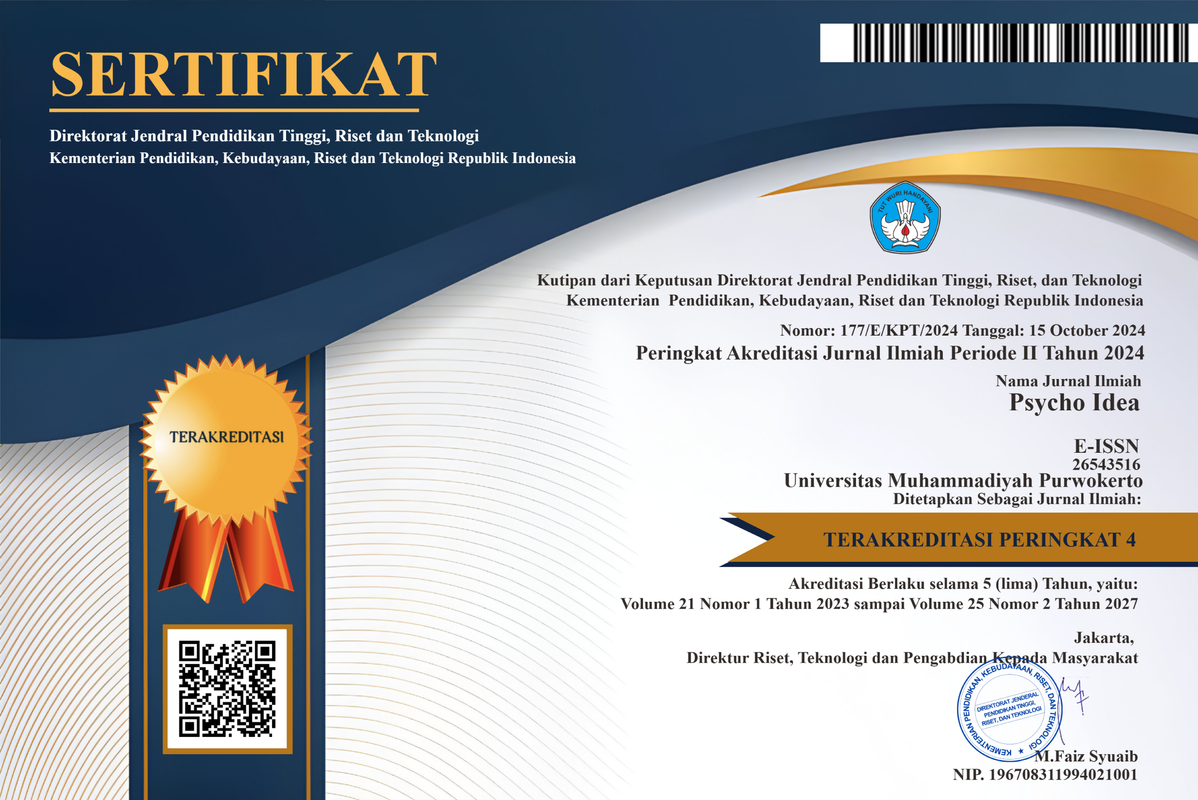EFEKTIFITAS TERAPI GERAK DALAM MENANGANI KESULITAN BELAJAR PADA PESERTA DIDIK SEKOLAH DASAR NEGERI 2 KRANJI PURWOKERTO
DOI:
https://doi.org/10.30595/psychoidea.v8i2.237Abstract
Penelitian ini bertujuan untuk menguji efektifitas terapi gerak dalam penanganan kesulitan belajar mata pelajaran bahasa Indonsia dan matematika peserta didik Sekolah Dasar Kranji 2 Purwokerto. Penelitian dilakukan menggunakan pendekatan kuantitatif dengan desain pre and post test eksperimen. Jumlah responden dalam penelitian ini adalah 30 peserta didik berkesulitan belajar yang diperoleh dari nilai rapot semester gasal dan dicocokkan dengan hasil tes IQ. Pelaksanaan eksperimen dilakukan oleh 4 fasilitator dalam terapi gerak, yang terdiri dari 2 mahasiswa dan 2 peneliti. Terapi dilaksanakan selama 16 kali pertemuan. Hasil penelitian: 1) untuk bidang studi Bahasa Indonesia, analisis data menggunakan uji Anova diperoleh F hitung sebesar 0,950. Dibandingkan dengan F tabel pada taraf signifikansi α = 0,05 dan df = 1;52 yaitu sebesar 4,03 (F hitung < F tabel = 0,950 < 4,03). Hasil itu menunjukkan tidak ada perbedaan yang signifikan antara nilai hasil ujian semester gasal dengan nilai ujian tengah semester genap tahun akademik 2010/2011. Artinya, terapi gerak tidak efektif untuk mengatasi kesulitan belajar bidang studi bahasa indonesia. 2) untuk bidang studi matematika analisis data menggunakan uji Anova diperoleh F hitung sebesar 3,662. Dibandingkan dengan F tabel pada taraf signifikansi α = 0,05 dan df = 1;52 yaitu sebesar 4,03 (F hitung < F tabel = 3,662 < 4,03). Hasil itu menunjukkan tidak ada perbedaan yang signifikan antara nilai hasil ujian semester gasal dengan nilai ujian tengah semester genap tahun akademik 2010/2011. Artinya terapi gerak tidak efektif untuk mengatasi kesulitan belajar bidang studi Matematika. Kata Kunci : Terapi Gerak, Kesulitan Belajar, Bahasa Indonesia, MatematikaReferences
Abdurrahman, M. 1994. Survai tentang Perkiraan Jumlah Siswa SD di DKI Jakarta yang Membutuhkan Pelayanan PLB. Laporan Hasil Penelitian. Jakarta: Lembaga Penelitian IKIP Jakarta
______________ . 1999. Pendidikan Bagi Anak Berkesulitan Belajar. Jakarta: PT. Rineka Cipta.
Fletcher, J.M., Foorman, B.R., Boudousquie, A., Barnes, M.S., Schatschneider, C & Francis, D.J (2002). Assesment of Reading and Learning Disabilities A Research-Based Inervention-Oriented Approach. Journal Of School Psychology. Vol. 40 No. 12 pp. 27-63
Hallahan, D. F, Kauffman, J. M., & Lloyd, J. W. 1985. Introduction to Learning Disabilities. New Jersey: Prentice-Hall Inc.
Lerner, J. (2003). Learning Disabilities: Theories, Diagnosis, and Teaching Strategies. Boston: Houghton Mifflin Company.
Nawangsari, N.A.F. dan Suprapti, V (t.t)., Identifikasi dan model intervensi gangguan kesulitan belajar pada siswa Sekolah Dasar di Surabaya. Jurnal. Fakultas Psikologi Universitas Airlangga
Setyono, I., 2008. Pelatihan Penanganan Kesulitan Belajar. Makalah. Bandung: Biro Konsultasi Dwipayana. 10 – 12 Oktober 2008.
Sternberg, R.G & Grigorenko E.L (2002). Difference Scores in The Identification of Children With Learning Disabilities It’s Time to Use A different Method. Journal of School Psychology Vol. 40 No. 1 pp. 65-83
Yusuf, M. S, Abdurrahman, M. (2003). Pendidikan bagi Anak dengan Problema Belajar. Solo: PT. Tiga Serangkai Pustaka Mandiri
Downloads
Published
Issue
Section
License
Authors published in this journal agree to the following terms:
- The copyright of each article is retained by the author (s) without restrictions
- The journal allows the author(s) to retain publishing rights without restrictions
- The author grants the journal the first publication rights with the work simultaneously licensed under the Creative Commons Attribution License, allowing others to share the work with an acknowledgment of authorship and the initial publication in this journal.
- Authors may enter into separate additional contractual agreements for the non-exclusive distribution of published journal versions of the work (for example, posting them to institutional repositories or publishing them in a book), with acknowledgment of their initial publication in this journal
- Authors are permitted and encouraged to post their work online (For example in the Institutional Repository or on their website) before and during the submission process, as this can lead to productive exchanges, as well as earlier and larger citations of published work
- Articles and all related material published are distributed under a Creative Commons Attribution-4.0 International Public License (CC - BY 4.0).
License
Psycho Idea is licensed under a Creative Commons Attribution- 4.0 International Public License (CC - BY 4.0).
You are free to :
Share — copy and redistribute the material in any medium or format
Adapt — remix, transform, and build upon the material for any purpose, even commercially











